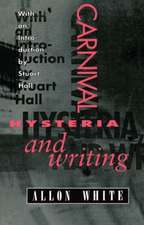Troublemakers: Power, Representation, and the Fiction of the Mass Worker: The American Literatures Initiative
Autor William Scotten Limba Engleză Paperback – 27 noi 2011
William Scott’s Troublemakers explores how a major change in the nature and forms of working-class power affected novels about U.S. industrial workers in the first half of the twentieth century. With the rise of mechanization and assembly-line labor from the 1890s to the 1930s, these laborers found that they had been transformed into a class of “mass” workers who, since that time, have been seen alternately as powerless, degraded victims or heroic, empowered icons who could rise above their oppression only through the help of representative organizations located outside the workplace.
Analyzing portrayals of workers in such novels as Upton Sinclair’s The Jungle, Ruth McKenney's Industrial Valley, and Jack London’s The Iron Heel, William Scott moves beyond narrow depictions of these laborers to show their ability to resist exploitation through their direct actions—sit-down strikes, sabotage, and other spontaneous acts of rank-and-file “troublemaking” on the job—often carried out independently of union leadership. The novel of the mass industrial worker invites us to rethink our understanding of modern forms of representation through its attempts to imagine and depict workers’ agency in an environment where it appears to be completely suppressed.
Analyzing portrayals of workers in such novels as Upton Sinclair’s The Jungle, Ruth McKenney's Industrial Valley, and Jack London’s The Iron Heel, William Scott moves beyond narrow depictions of these laborers to show their ability to resist exploitation through their direct actions—sit-down strikes, sabotage, and other spontaneous acts of rank-and-file “troublemaking” on the job—often carried out independently of union leadership. The novel of the mass industrial worker invites us to rethink our understanding of modern forms of representation through its attempts to imagine and depict workers’ agency in an environment where it appears to be completely suppressed.
| Toate formatele și edițiile | Preț | Express |
|---|---|---|
| Paperback (1) | 291.49 lei 6-8 săpt. | |
| Rutgers University Press – 27 noi 2011 | 291.49 lei 6-8 săpt. | |
| Hardback (1) | 829.53 lei 6-8 săpt. | |
| Rutgers University Press – 27 noi 2011 | 829.53 lei 6-8 săpt. |
Din seria The American Literatures Initiative
-
 Preț: 290.56 lei
Preț: 290.56 lei -
 Preț: 288.81 lei
Preț: 288.81 lei -
 Preț: 289.20 lei
Preț: 289.20 lei -
 Preț: 286.90 lei
Preț: 286.90 lei -
 Preț: 307.87 lei
Preț: 307.87 lei -
 Preț: 311.36 lei
Preț: 311.36 lei -
 Preț: 277.95 lei
Preț: 277.95 lei -
 Preț: 344.67 lei
Preț: 344.67 lei -
 Preț: 316.07 lei
Preț: 316.07 lei -
 Preț: 288.59 lei
Preț: 288.59 lei -
 Preț: 288.81 lei
Preț: 288.81 lei -
 Preț: 288.21 lei
Preț: 288.21 lei -
 Preț: 288.21 lei
Preț: 288.21 lei -
 Preț: 291.11 lei
Preț: 291.11 lei - 27%
 Preț: 825.88 lei
Preț: 825.88 lei -
 Preț: 288.21 lei
Preț: 288.21 lei - 27%
 Preț: 186.33 lei
Preț: 186.33 lei - 27%
 Preț: 185.90 lei
Preț: 185.90 lei
Preț: 291.49 lei
Nou
Puncte Express: 437
Preț estimativ în valută:
55.78€ • 58.39$ • 46.15£
55.78€ • 58.39$ • 46.15£
Carte tipărită la comandă
Livrare economică 05-19 aprilie
Preluare comenzi: 021 569.72.76
Specificații
ISBN-13: 9780813551906
ISBN-10: 0813551900
Pagini: 288
Ilustrații: 10 illustrations
Dimensiuni: 152 x 229 x 17 mm
Greutate: 0.44 kg
Ediția:None
Editura: Rutgers University Press
Colecția Rutgers University Press
Seria The American Literatures Initiative
ISBN-10: 0813551900
Pagini: 288
Ilustrații: 10 illustrations
Dimensiuni: 152 x 229 x 17 mm
Greutate: 0.44 kg
Ediția:None
Editura: Rutgers University Press
Colecția Rutgers University Press
Seria The American Literatures Initiative
Notă biografică
WILLIAM SCOTT is an associate professor of English at the University of Pittsburgh. His articles have appeared in a number of journals, including Callaloo, MLN, and American Literature.
Cuprins
Introduction : power, representation, fiction
The making of the mass worker. The powerless worker and the failure of political representation : "the lowest and most degraded of human beasts" ; The empowered worker and the technological representation of capital : "out of this furnace, this metal"
Strategy and structure at the point of production. The disempowering worker and the aesthetic representation of industrial unionism : "I am the book that has no end!" ; The powerful worker and the demand for economic representation : "they planned to use their flesh, their bones, as a barricade"
Conclusion : Making trouble on a global scale
The making of the mass worker. The powerless worker and the failure of political representation : "the lowest and most degraded of human beasts" ; The empowered worker and the technological representation of capital : "out of this furnace, this metal"
Strategy and structure at the point of production. The disempowering worker and the aesthetic representation of industrial unionism : "I am the book that has no end!" ; The powerful worker and the demand for economic representation : "they planned to use their flesh, their bones, as a barricade"
Conclusion : Making trouble on a global scale
Recenzii
"Unfailingly provocative, this is an intelligent book noteworthy for its refusal to be mired in old approaches and its consequent ability to break new ground in the study of both working class fiction and the more general relationship of factory and artistic production."
"Troublemakers is an entirely commanding and engrossing study of the new forms of workers' control and representation that modern mass-industrial work made available—rich and strange in archive, theoretically fresh and creative, historically acute."
"Troublemakers is an original take that provides eyeopening insights about different ways acts of resistance by the mass worker, including a refusal to work, may be represented. Scott has added a polished contribution to the list of essential interpretations in the field."
"William Scott's Troublemakers, though in part a work of literary criticism, in fact offers fascinating insight into the modes of resistance adopted by the mass industrial worker in America between the 1890s and the 1930s."
"Troublemakers offers fascinating insight into the modes of resistance adopted by the mass industrial worker in America between the 1890s and the 1930s."
Descriere
William Scott’s Troublemakers explores how a major change in the nature and forms of working-class power affected novels about U.S. industrial workers in the first half of the twentieth century. Analyzing portrayals of workers in such novels as Upton Sinclair’s The Jungle, Ruth McKenney’s Industrial Valley, and Jack London’s The Iron Heel, William Scott moves beyond narrow depictions of these laborers to show their ability to resist exploitation through their direct actions—sit-down strikes, sabotage, and other spontaneous acts of rank-and-file “troublemaking” on the job—often carried out independently of union leadership.
















